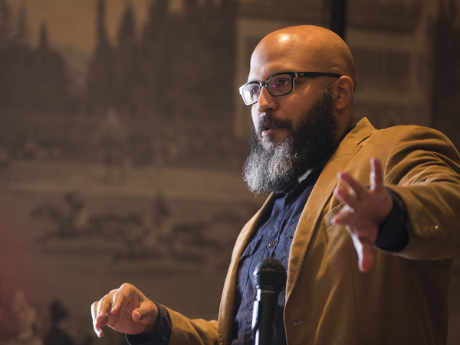Q & A: American Poetry
Q & A American Poetry: John Murillo

Some Thoughts After Re-reading Hughes' "I, Too, Sing America"
(Remembering Ms. Clifton Remembering:
Why Some People Be Mad at Me Sometimes
They ask me to remember
But they want me to remember
Their memories
And I keep on remembering mine )
I am American. I am a poet. I am an American poet. But like Langston and the rest of his children, I am a darker brother American poet, which is to say that in this American Republic of Poetry (to borrow from Martin Espada), I am—and for all practical purposes, may ever remain—one of the marginalized others. And that's fine. As I once heard a young Chicano slam poet exclaim, "I write for real Americans! Americans with names like Hector and Chucho and Marisol! Names like Nia, Imani, and Sulayman!" Or, as the great Uruguayan novelist, Eduardo Galeano, says, "I write for those who cannot read me."
I write, first of all, in the tradition of the witness. My foremothers and fathers, therefore, come in all shades and with varied accents. Such writers as Walt Whitman, Pablo Neruda, Audre Lorde, Ceslaw Milosz, Gwendolyn Brooks, Etheridge Knight, Nazim Hikmet, Sonia Sanchez, and Grandmaster Melle Mel guide my hand whenever I write. And I am honored to list among my contemporaries such fine poets as Aracelis Girmay, Suheir Hammad, and the Mighty Mos Def.
*
As a nation goes, so go its arts (and arts institutions). My president is Black. The Boston Celtics are Black. The Karate Kid is Black. I'm never surprised, then, when I see a few of Langston's children, darker brothers (seldom any sisters), dining now at the literary big tables—on the boards of grant giving institutions, directing university writing programs, judging book contests, etc. This is what they call "post-racial," no? A few dusky faces in the smiley places? As a writer beginning to enjoy a bit of that privilege—bib securely fastened, salad fork in hand—I can't help at times to wonder if my function is to divert, to shift the focus from those still forced to the kitchen to eat, not to mention all those broad, brown, noses pressed to the kitchen windows, the fingers picking at the locks.
*
As a nation goes…
I predict changes to occur on the poetic landscape just a bit more slowly than they do at the political or societal levels. There will be your "safer" poets reciting in hallowed halls, and your renegade rabble shouting down walls. Radical Black, poor White, Gay, Asian and Latino writers will bumrush the borders of this republic and the Good Ol' Boys will conspire stronger barbed wire.
All this, too, is America.
Published 2010.


